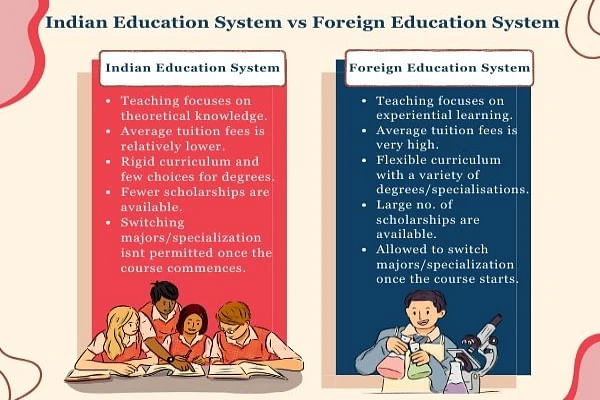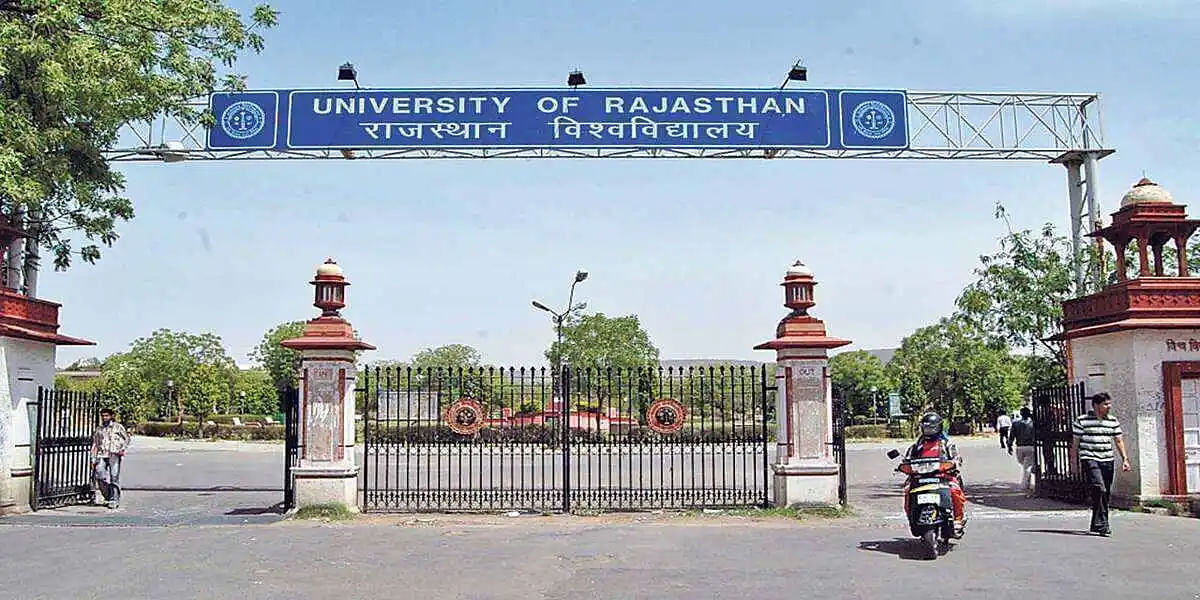The biggest difference between Indian education system vs foreign education system is a difference in the curriculum and teaching methodology. The Indian curriculum is traditional and based on theories whereas the curriculum in the foreign countries is advanced and allows critical thinking.
The difference between the Indian education system vs foreign education system lies in the system of education, tuition fees, faculty, and curriculum followed. The curriculum differs significantly between countries.
There are many Indians who wish to study abroad. It is important for them to know the difference between the education system of India and that of the country they wish to further their education in. Irrespective of the differences, it is best to go with an option - India or abroad - that is most suitable for the career of an individual.
Differences Between Indian Education System vs Foreign Education System
There are up-sides and down-sides with both the Indian system of education and the foreign system of education. Before planning to enrol in a course, it is crucial to measure the differences between the systems.

Listed below are the differences between the Indian education system vs foreign education system:
1. System of Education
This is a major area of difference between the Indian education system vs foreign education system. The Indian education system primarily follows the traditional system which focuses mostly on theories. With the new age, new and advanced ways of learning have emerged, but the basic form of education remains the same.
Most of the education is based on theoretical learning. Students are evaluated on the basis of their year-end exams. This system has both pros and cons. While it improves the retention skill of the students, it hinders creative thinking in the students.
Experiential learning is not much a part of the Indian system of education. In foreign countries, like Canada, critical thinking, analytical skills and creativity are prioritised over rote learning.
The internship programs in Indian education can be found only in the professional courses, whereas in other countries, the internship programs are prioritised in all courses.
There is an advantage of the Indian system of education in that, the professionals such as doctors, engineers, teachers, and other professionals are equipped with very good knowledge of the theories of the subjects concerned and therefore can do complete justice to their professions.
Also Check: Types of Education: Formal, Informal & Non-Formal
2. Curriculum
There is a vast difference in the curricula of the Indian education system vs foreign education system. The Indian curriculum is rather rigid compared to other countries. The scope of exploring new fields is now emerging in the education system of India.
There is a bifurcation of streams based on arts, commerce and science in the secondary school, following which the student chooses a career path based on the stream. There are central boards as well as state boards of education in India. Hence, the curriculum throughout the country is not uniform.
While the differences between the curricula of different boards might not be vast, slight differences do exist. Since the choice is limited in terms of scope of education, the interdisciplinary skills are not possible beyond a certain point.
In India, the theories taught in the schools, colleges, and other higher educational institutions have already been researched. In contrast, the foreign curriculum includes diverse choices with respect to the subjects. This allows the students to take up any course that they are interested in.
Even at the school levels, the students in the foreign curriculum are allowed to conduct research and thereby gain a practical knowledge of the subject rather than going by the theories only. This makes the curriculum not just rich but interesting as well to the students.
Also Check: Difference Between Curriculum and Syllabus
3. Research Methodology
Owing to the difference in curriculum, there is a difference in the research methodologies as well. India has several higher educational institutions where the research methods are advanced. These national or state level institutions offer great faculty as well as developed methods of research.
The research methods in the foreign countries are also well developed. They offer exploration of new fields and studies. The methods of research are world class allowing the analytical skills to grow in the students.
The education systems of the foreign countries, especially the education system of United Kingdom, United States education system, or the Canadian education system follow the methods of research and innovation. The faculty from the Indian universities and colleges mostly go abroad to teach.
This also ascertains that the Indian curriculum and methods of teaching creates a very strong base that helps them get selected for faculty in the foreign countries.
Also Check: Types of Research Methodology for Students
4. Tuition Fees
The tuition fees are much higher in the foreign countries as compared to India. This is mostly because of the currency strength. The top-class government universities and institutions have nominal fees as compared to the private institutions. The private institutions that are renowned have very high tuition fees.
However, the foreign universities have very high tuition fees that makes them not quite affordable to the Indians without a scholarship or a study loan. However, for the natives of the developed foreign countries, the fees are either or the education is free altogether.
For Indian nationals studying abroad, there are other costs involved apart from the course fee, such as room rent, food, and travel. The cost of studying abroad is much higher as compared to studying in the country itself.
Also Check: Top 10 Affordable Universities in India
What are the Advantages of Studying in India?
The Indian education system has evolved a lot in recent years. While sticking to the traditional theoretical lessons, it has also improvised the ways of teaching. There are several institutions at the national level that impart high-end and world class learning facilities. There are several advantages to studying in India.
The advantages of studying in India are:
- Career Opportunities: The top ranking Indian institutes offer very good career opportunities. The courses that are professional in nature, have internship and placement opportunities as part of their curriculum. The students are placed in some of the top ranking institutions or companies, not just inIndia but globally as well.
- Cost Efficient: The courses abroad are more expensive than similar courses of the same standard offered in the Indian colleges, universities or other institutions. Compared to the most famous education hubs like the United Kingdom and United States.
- Top Ranking Institutions: India has few of the globally top ranking universities. These universities and colleges offer few of the most advanced and futuristic courses. The students can enrol here only if they have scored very good marks in the previous qualifying exam.
Also Check: List of Tier 1 Colleges in India 2023: Engineering, Medical, Management
What are the Advantages of Studying Abroad?
Owing to the well researched curriculum and flexibility in the education system, most students nowadays choose to study abroad. There are a number of advantages of studying abroad, as listed under:
- Opportunities: Studying in a foreign institute opens a number of opportunities for the students in their professional life ahead, both abroad as well as in India.
- Language: The students get an opportunity to be well acquainted with a foreign language living in the foreign country.
- Valuation: Even in India itself, a foreign degree is given more importance than the native degree. As a result of this there is an increased tendency among the higher institutions as well as recruiters to give preference to individuals who have completed their higher studies from a foreign institution.
- Confidence: Being outside the country and staying with different nationals stems confidence in the students. They become better equipped to face the interviews both at the higher institutions as well as in the workplaces.










